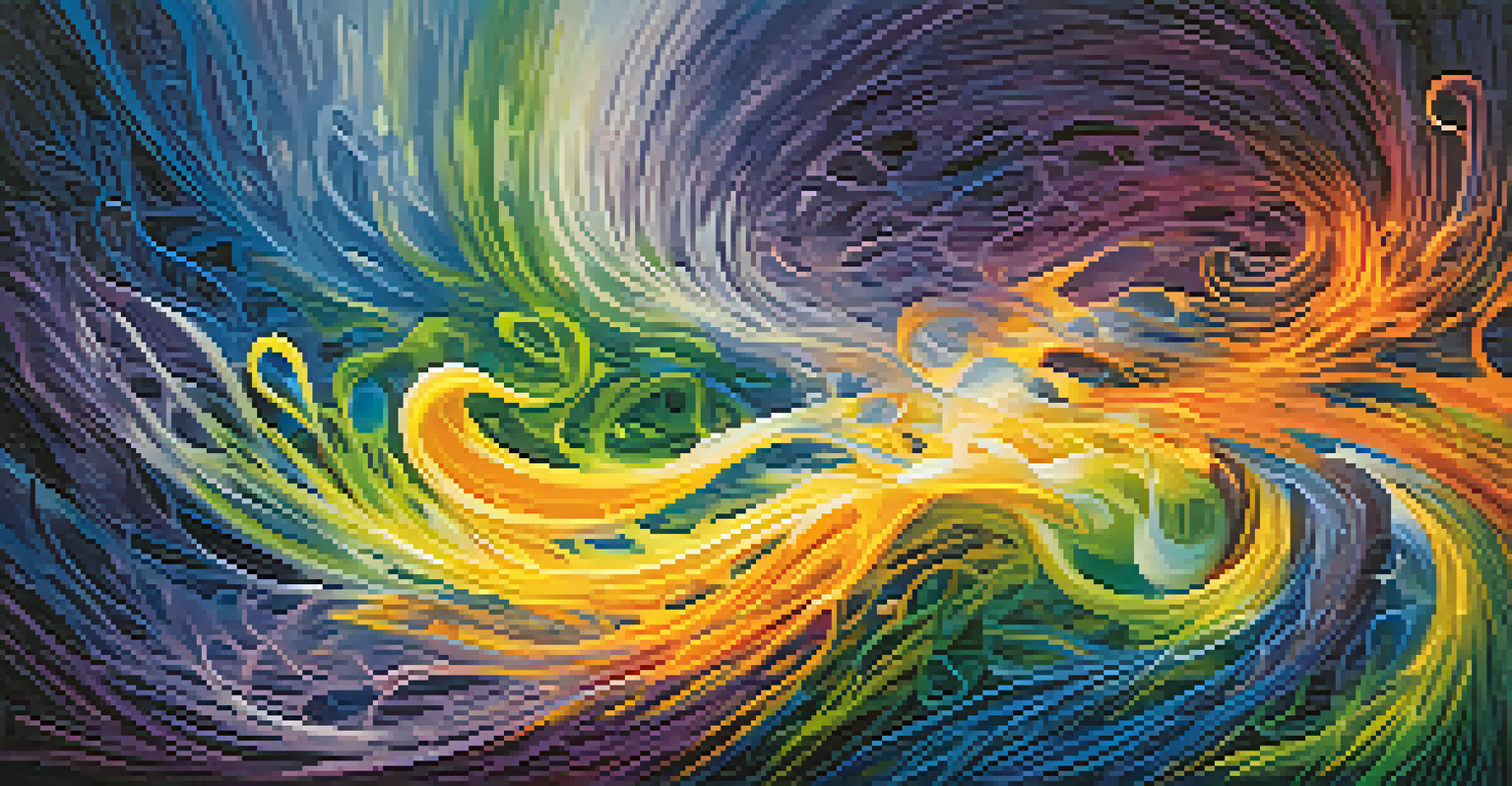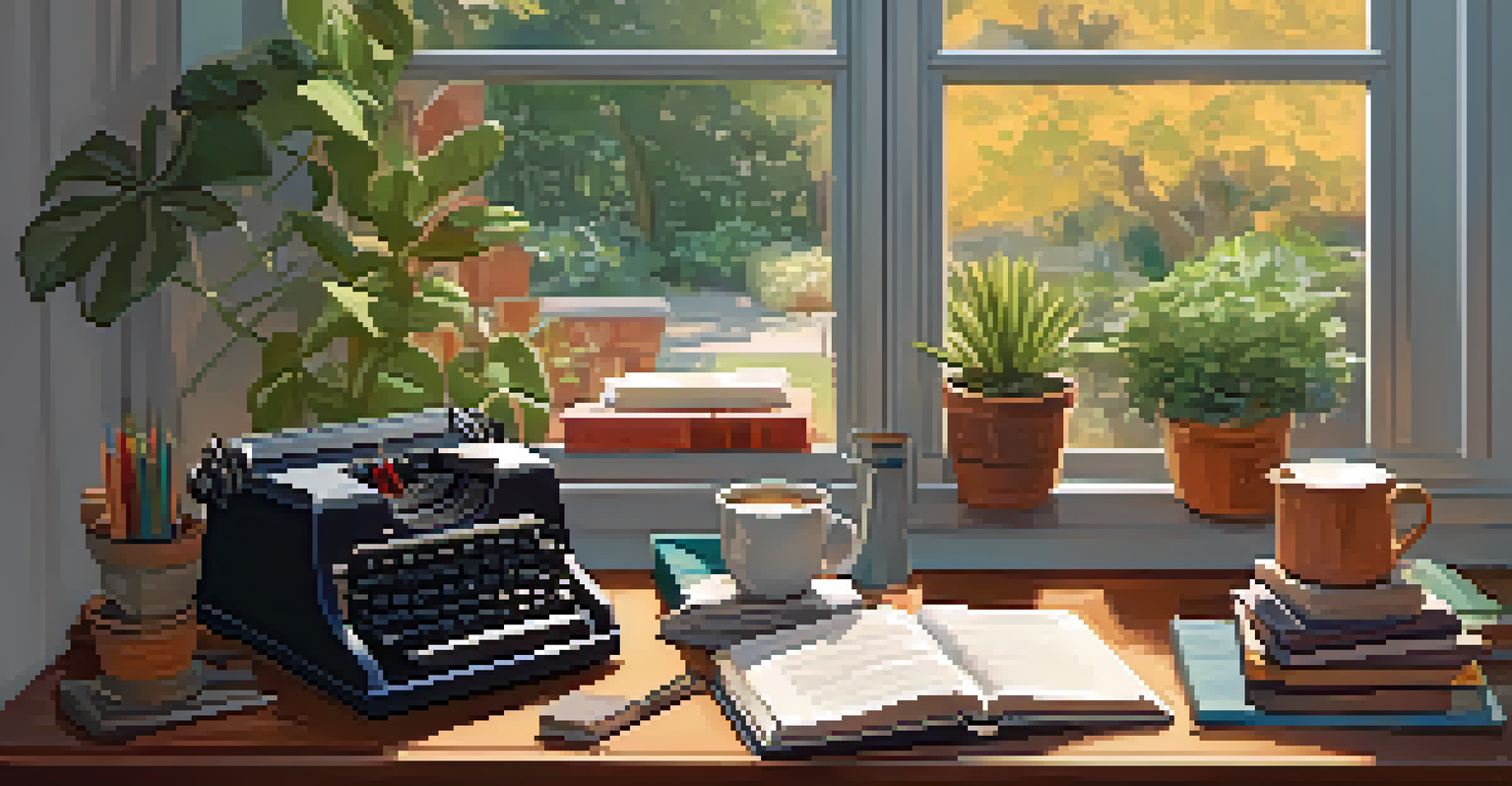Entheogens and the Writer's Journey: A Transformative Path

Understanding Entheogens: A Brief Overview
Entheogens, often referred to as psychedelics, are substances that can induce altered states of consciousness. These experiences have been used for centuries in various cultures for spiritual and creative exploration. Writers have increasingly turned to these substances for inspiration and clarity in their creative processes.
The experience of touching the divine within oneself can be a gateway to creativity and understanding.
The term 'entheogen' comes from the Greek words meaning 'to generate the divine within.' This highlights the potential of these substances to unlock deeper layers of the mind, often leading to profound insights. For many writers, this can translate into a burst of creativity, helping them overcome writer's block or find new perspectives.
While there is ongoing research into the therapeutic benefits of entheogens, their impact on creativity is a fascinating area of exploration. Writers like Aldous Huxley and Jack Kerouac have openly discussed their experiences with these substances, illustrating a historical connection between psychedelics and literary innovation.
The Writer's Struggle: Finding Inspiration
Every writer knows the feeling of hitting a wall—when words just won't flow, and ideas seem to vanish. This struggle can be frustrating and demoralizing, leading to self-doubt and a loss of motivation. Many writers seek various methods to reignite their passion and creativity, from meditation to travel.

In this quest for inspiration, entheogens have emerged as a compelling option for some. By altering consciousness, these substances can provide fresh perspectives and new ideas, allowing writers to tap into their subconscious. It's almost like turning on a creative faucet that had been turned off.
Entheogens Enhance Creative Insight
These substances can unlock deeper layers of the mind, potentially leading to bursts of creativity and new perspectives for writers.
However, it's important to approach this path with caution and respect. While entheogens can open doors to creativity, they are not a magic bullet. Writers should prioritize safety and mindfulness, ensuring that their exploration is grounded in an understanding of the substance's effects.
Personal Journeys: Writers Share Their Experiences
Many writers have shared their transformative journeys with entheogens, offering a glimpse into how these experiences can reshape their creative processes. For instance, a novelist might describe how a psychedelic trip helped them see their characters in a new light, leading to richer story arcs and deeper emotional connections.
Creativity is allowing yourself to make mistakes. Art is knowing which ones to keep.
These anecdotes often reveal a common theme: a sense of connection to something greater. Writers frequently report feeling more in tune with nature, humanity, or even the universe itself during their experiences. This connection can infuse their writing with authenticity and depth, resonating with readers on a profound level.
While individual experiences vary widely, the overarching narrative is one of transformation. Writers have found that entheogens can serve as a catalyst for change, pushing them to confront their fears, explore their imaginations, and ultimately become better storytellers.
Navigating the Risks: A Cautionary Tale
While the allure of entheogens can be strong, it's crucial to recognize the potential risks involved. Not every experience will lead to enlightenment or creativity; some can be disorienting or even traumatic. Writers must weigh these risks carefully before embarking on their journeys.
It's also essential to consider the legal status of entheogens, which varies significantly around the world. In some places, they are still classified as illegal substances, leading to potential legal repercussions. Writers should educate themselves about the laws in their area and make informed decisions.
Caution is Essential with Entheogens
While entheogens can inspire creativity, writers must approach their use with care, mindfulness, and an understanding of the potential risks involved.
Moreover, setting and mindset play a significant role in the experience. A supportive environment and a clear intention can make all the difference, helping writers to harness the creative potential of entheogens while minimizing the risks.
The Science Behind Entheogens and Creativity
Recent studies have begun to uncover the neurological effects of entheogens, shedding light on how they may enhance creativity. These substances can promote neuroplasticity, allowing the brain to form new connections and ideas. This scientific insight adds a fascinating layer to the anecdotal evidence of entheogens' impact on writers.
One key finding is that entheogens can facilitate divergent thinking, which is often linked to creativity. This type of thinking allows for the generation of multiple ideas or solutions, making it an invaluable asset for writers facing creative blocks. Essentially, these substances can help writers think outside the box.
However, it's essential to approach these findings with a critical mind, as research is still in its early stages. While the potential is exciting, writers should remember that creativity is complex and influenced by many factors, not solely entheogens.
Integration: Bringing Insights to the Page
After a transformative experience with entheogens, the real work begins: integrating those insights into writing. This process can be both challenging and rewarding, as writers sift through their experiences to find the gems that resonate with their creative vision. Journaling can be a helpful tool during this phase.
It’s important to give oneself permission to explore these new ideas without judgment. Some concepts may seem wild or impractical at first, but they could hold the key to unlocking a unique narrative or character development. Embracing the unexpected can lead to groundbreaking work.
Integration of Experiences is Key
After using entheogens, writers need to thoughtfully integrate their insights into their work, often through journaling and community support.
Moreover, sharing these experiences with a supportive community can provide additional perspectives and encouragement. Writers can help each other navigate the complexities of integration, ensuring that the insights gained from entheogens enrich their writing rather than overwhelm them.
Conclusion: Embracing the Journey of Creativity
The journey of a writer is often filled with ups and downs, and exploring entheogens can add a unique dimension to this path. While they offer potential for enhancing creativity and unlocking new ideas, they also require careful consideration and respect. The key is finding a balance that works for the individual.
Ultimately, every writer's journey is personal and unique. Some may find inspiration in entheogens, while others may prefer traditional methods. The beauty of creativity lies in its diversity, and what works for one writer may not resonate with another.

As writers continue to explore the depths of their craft, embracing both the light and shadow of their experiences can lead to richer, more authentic storytelling. In this way, the writer's journey becomes not just a path of creation, but also one of self-discovery and transformation.